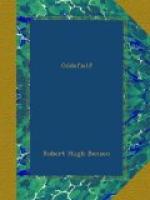It was now for the first time that I understood how shrewdly, and yet how clumsily now and then, the man had weaved together his information. He spoke with an abundance of detail that astonished me; he spoke of names and places with the greatest precision; he related how himself had been sent from St. Omer’s with fifty pounds promised him, to kill Dr. Tonge who had lately translated a book from the French named “The Jesuits’ Morals”; he spoke of a chapel in Mrs. Sanders’ house, at Wild-House, where he had been present, he said, at a piece of conspiring; and so forth continually, interlarding his tale with bursts of adjuration and piety and indignation, so evidently feigned—though with something of the Puritan manner in it—that I marvelled that any man could be deceived who did not wish to be; and all with his vile accent. He spoke much also, as Mr. Whitbread had told me that he would, of the consult of the Fathers—of all that is, who had the jus suffragii in England—that had been held at the White Horse Tavern in the Strand, in April; pretending that at this the murder of the King was again decided upon, and designed too, in all particulars; how Mr. Pickering and Mr. Grove had been deputed to do the killing in St. James’ Park with screwed pistols, as His Majesty walked there, or if not there, at Newmarket or Windsor; and how commissions had been given to various persons (whom he named), which they were to hold in the army that was to be raised, when His Majesty had been murdered, and the French King Louis let in with his troops. Worst of all, however, was the assertion which he made again and again that no Catholic’s oath, even in Court, could be taken to be worth anything, since the Pope gave them all dispensations to swear falsely; for such an assertion as this deprives an accused man of all favour with the jury and destroys the testimonies of all Catholic witnesses. And, what amazed me most of all was that Chief Justice Scroggs supported him in this, and repeated it to the jury again and again. He said so first to Mr. Whitbread, before he was withdrawn.
“If you have a religion,” he said, “that can give a dispensation for oaths, sacraments, protestations and falsehoods, how can you expect that we should believe you?”
“I know no such thing,” said Mr. Whitbread very tranquilly.
Bedloe, too, told the same tale as he had told before, but with many embellishments; and was treated by my Lords with as much respect, very nearly, as Oates himself; and they were both given refreshment by the Chief Justice’s order.
* * * * *




